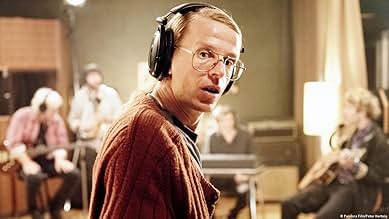Gundermann
- 2018
- 2h 8min
La vita del cantante e scrittore della Germania dell'Est Gerhard Gundermann e delle sue lotte con la musica, la vita come minatore di carbone e i suoi rapporti con la polizia segreta (STASI)... Leggi tuttoLa vita del cantante e scrittore della Germania dell'Est Gerhard Gundermann e delle sue lotte con la musica, la vita come minatore di carbone e i suoi rapporti con la polizia segreta (STASI) della RDT.La vita del cantante e scrittore della Germania dell'Est Gerhard Gundermann e delle sue lotte con la musica, la vita come minatore di carbone e i suoi rapporti con la polizia segreta (STASI) della RDT.
- Premi
- 10 vittorie e 8 candidature totali
Recensioni in evidenza
Sometimes trying to make the world a better place though can backfire. Something that is evident here. You know the saying about good intentions ... and while he seems decent, he finds himself in a position that is weird to say the least. As a viewer we are left to feel a struggle ... every human is different and being right, does not always mean you did the right things ...
The authentic interpretation of Gerhard Gundermanns poetic and mostly deep songs is the most fascinating part of the movie, closely followed by the makeup departments stunningly exact remodeling of Gundermann's face. Even his widow has said in interviews it was spooky to look into the face of her deceased husband just as she remembered it from 15 years ago.
In fact both Dresen's singing and his looks are so close to the original that I have to listen closely when hearing a song from the movie to distinct it from one of the original works of the popular East German songwriter who as many had to find a way of dealing with the profound changes of 1990. the big turning point in Germany's most recent history.
The film also achieves an unbiased perspective leaving it to the spectator to find a point of view towards Stasi activities and SED ideology. A fascinating and totally underrepresented movie on this platform. Just see for yourself.
In recent months, I have seen several films made in Eastern Europe (Romania, Russia) that had as their subject the way in which informants were recruited by the secret services which were the main tools for terrorizing the population and repressing dissidents. The hero of this film, Gerhard Gundermann was a somewhat of a special case. His enlistment in STASI was not the result of extreme pressure or blackmail, nor was opportunism the reason. The film presents him as an idealist and a rebel, who believed in the ideals of communism, and wanted to apply them for the benefit of people and society. But the system was so corrupt that it did not even assimilate Gundermann as an informant or as a party member but for a few years. However, this relatively short period was enough to compromise him morally and for his 'reports' about co-workers or fellow musicians to influence their lives, may destroy some. Later came the attempt to forget, the 'amnesia', the attempt to recover morally, the impossible forgiveness from those who sufered. Examining Gundermann's case, director Andreas Dresen questions the moral bases of an entire system in which all citizens had files of victims at STASI, but a significant part of them also had files of collaborators. How was it possible for a large part of the population of East Germany to collaborate with those who oppressed them? A question similar to the one that can be asked about the collaboration with the Nazi regime a few decades before. It seems shocking how easily most of those who are confronted with the news about Gundermann's collaboration accept it as a fact, as an attitude that even if it cannot be forgiven can be understood, forgotten and buried in silence. But can we, today, judge retrospectively that era and those who lived it?
The biopic by Andreas Dresen enjoys the exceptional performance of Alexander Scheer, who manages to bring to the screen the personality of Gundermann in all its complexity, and to get closer to his physical appearance and original music. The only aspect that did not succeed perfectly for the director and the actor are these related to time switching. The narrative jumps permanently between three periods (around 1976, the 80s, and 1992) which makes sense in the gradual construction of the character, but the physical appearance of the hero is always almost the same, and we need a few seconds each time to assimilate from the visual context or from dialogues in what period of time the scene takes place. Fortunately, the sets and props authentically describe the three moments in time, and the orientation is not very difficult. The rest of the cast does its job more than satisfactorily, with discreet and natural interpretations. A special mention deserves Anna Unterberger for the role of Conny, Gerhard Gundermann's wife, describing the woman behind in a non-trivial love affair, with many moments of doubt and crisis. Music plays an important role, about a third of the two-hour screening time is occupied by Gundermann's songs, which Alexander Scheer performs perfectly, and I hope other viewers will have the chance - as I did - to watch a copy of the movie that contains the original soundtrack and the lyrics of the songs in subtitles. Follow the words, because they punctuate, complement and broaden the understanding of the character, a troubadour and an anti-hero of a complex era.
Lo sapevi?
- QuizWith 6 wins, was the most awarded film at the 2019 German Film Awards.
- Citazioni
Gerhard Gundermann: [to a Communist Party leader] Why are you driving a western car while everyone else here has a Trabant? And what are your long-term concepts for our energy policy?
- ConnessioniFeatures Glücksrad (1988)
- Colonne sonoreGras
Performed by Alexander Scheer
I più visti
- How long is Gundermann?Powered by Alexa
Dettagli
- Data di uscita
- Paese di origine
- Siti ufficiali
- Lingue
- Celebre anche come
- Гундерманн
- Luoghi delle riprese
- Aziende produttrici
- Vedi altri crediti dell’azienda su IMDbPro
Botteghino
- Lordo in tutto il mondo
- 1.315.845 USD
- Tempo di esecuzione2 ore 8 minuti
- Colore
Contribuisci a questa pagina






























